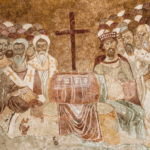Four big reasons why we still need the Reformation in our society today

The Reformation happened five hundred years ago. That might seem like a long time. And, with Christianity—Catholic and Protestant—on the ropes in Western society, we might wonder whether it still matters that much. Here are four big reasons why we still need the Reformation in our society today, regardless of the Roman Catholic Church.
1. Because the Reformation can help us in our relationships with each other
Western societies have become angry, divided and increasingly polarised. The signs of it are clear on our Facebook pages, on chat shows, podcasts, Universities and on our streets. The trends are worrying. Many have grown cynical about the value of liberal freedoms. Some are increasingly attracted to the idea of violence as a political instrument.
These developments can be largely traced to overconfidence. Modern life allows us to live in self-reinforcing ideological bubbles which makes our own theories seem beyond question. At the same time, a string of authorities and politicians have exaggerated our ability to change the world for good.
But reformed theology tells us not to think so highly of human opinions or to be so optimistic about the potential for politics to improve the world. Long before postmodernism or pluralism, the Reformers warned that every human mind and every group is subject to the corrupting influence of sin. Only Jesus and the Scriptures that testify to him can be fully trusted. The rest of us, both individually and corporately, need the help of the Spirit to receive truth. Even after we believe, we need the same Spirit to go on reforming us. Our lives need to be marked by ongoing repentance.
By putting absolute confidence in Scripture, and withholding it from reason and institutions, the reformers avoided relativism (who knows what’s true?) and totalitarianism (we do, now believe it!). Although it would take many years for Europe to unlearn the old habits of state coercion, the Reformation was a watershed for freedom of conscience and civil discourse. As Luther writes to the Elector:
Since, then, belief or unbelief is a matter of every one’s conscience … [secular power] should be content and attend to its own affairs and permit men to believe one thing or another, as they are able and willing, and constrain no one by force. For faith is a free work, to which no one can be forced. Nay, it is a divine work, done in the Spirit, certainly not a matter which outward authority should compel or create. Hence arises the well-known saying, found also in Augustine, “No one can or ought be constrained to believe.”
2. Because the Reformation can help us think about ourselves and our lives
Modern times are stressful. Despite our many outward blessings, many of us feel like our lives aren’t what they should be. We worry that we aren’t fulfilling our potential—that nobody really knows and appreciates us for who we are. Rates of depression and anxiety seem to be steadily increasing.
As we cast about for keys to unlock our unhappiness, we find ourselves turning to more desperate (and less unlikely) solutions. Some of us dream of breakthrough success—fame and fortune in the field of our choosing. Others turn inward, hoping to find the source of our distress in their gender, sexuality or racial identities. And the (dwindling) romantics among us still pin their hopes of fulfillment on the idea of a soulmate.
Reformation theology offers better solutions. It urges us to look up. What we actually need isn’t a new career, a new partner or a new identity: we need to know the Maker of the Universe. If we come to him through Christ it will change everything we are and everything we do.
First, if we put our trust in Jesus, God’s Spirit will give us a new identity—Christ’s. 17th century Puritan Richard Sibbes offers a classic Reformed perspective in his Description of Christ:
Christ is a Son; the Spirit tells us we are sons. Christ is an heir; the Spirit tells us we are heirs with Christ. Christ is the king of heaven and earth; the Spirit tells us that we are kings, that his riches are ours. … The grace and sanctification we have, it is not in our own keeping … the spring is in Christ. … All treasure is hid in Christ for us. What a comfort is this in anything we lack!
Second, knowing God through Christ can also transform our work. As Luther writes, for those who live by faith, everything is spiritual:
Your work is a very sacred matter. God delights in it, and through it He wants to bestow His blessing on you.
Or again:
We should accustom ourselves to think of our position and work as sacred and well-pleasing to God, not on account of the position and the work, but on account of the word and faith from which the obedience and the work flow. No Christian should despise his position and life if he is living in accordance with the word of God, but should say, “I believe in Jesus Christ, and do as the ten commandments teach, and pray that our dear Lord God may help me thus to do.” That is a right and holy life, and cannot be made holier even if one fast himself to death.
3. Because the Reformation reminds us of the real path to heaven
When people lose contact with God, they often try to find what they’re missing in the lower heavens. Sometimes that means worshipping gods and demons; sometimes it means trying to get in touch with the spirits of the dead.
In recent years, our society has tried to slake its spiritual thirst through fantasies of myth, magic and other worlds. This trend has exponentially increased with time—and it has also become more explicitly religious—think of the messianic shades in Man of Steel or the appearance of demigods in the Marvel and DC pantheon.
Such fiction isn’t necessarily wrong. But it can’t satisfy the cravings that produce it. The next logical step is to try real magic and real paganism—and that won’t work either. Our hearts were made for God alone.
The Reformation also arose in a time of myths. Without a clear idea of how to gain access to a holy God, medieval Christians turned their eyes to inferior realms. They imagined saints and angels to pray to; stages of purgatory and heaven to ascend through; states of mind to aspire to. Many looked to Mary, hoping for a more motherly entrée to her scary son.
But the reformers, following Paul and the writer of Hebrews, saw that there was no hope for getting to God except directly through Jesus—and no need to look elsewhere. Jesus, through his sacrifice and intercession had done everything necessary to make his people right with God:
We believe that we have no access to God except through the one and only Mediator and Intercessor: Jesus Christ the Righteous…. But this Mediator, whom the Father has appointed between himself and us, ought not terrify us by his greatness, so that we have to look for another one, according to our fancy. For neither in heaven nor among the creatures on earth is there anyone who loves us more than Jesus Christ does.
(Belgic Confession, 26)
4. Because Our Real Need is Always the Same
Of course our real problems aren’t really to do with each other, or with ourselves, or with our place in the world. The real problem is that we have sinned and destroyed our relationship with God. That’s as true today as it was five hundred years ago. The visible effects might look different, but the root cause is the same.
And so is the solution. The glory of the Reformation is that it didn’t do anything new but simply pointed back to Jesus: Jesus who is as relevant in 2017 as he was in 1517—or in 117AD, for that matter. Here is a timeless note to finish with from the Heidelberg Catechism:
Q. What is your only comfort in life and death?
A. That I am not my own, but belong with body and soul, both in life and in death, to my faithful Saviour Jesus Christ. He has fully paid for all my sins with His precious blood, and has set me free from all the power of the devil. He also preserves me in such a way that without the will of my heavenly Father not a hair can fall from my head; indeed, all things must work together for my salvation. Therefore, by His Holy Spirit He also assures me of eternal life and makes me heartily willing and ready from now on to live for Him.















